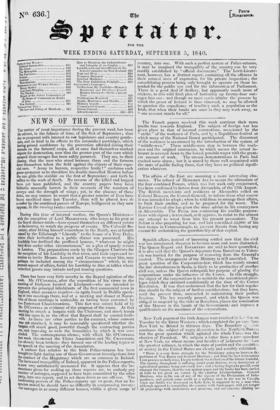There has been very little novelty in the Repeal agitation
of the week. Mr. O'CoNNer,r,, after the exposition of his views to the meeting of Irishmen located at Liverpool—who are intended to represent the principal inhabitants of the first commercial town in England, when occasion requires—is again fmnd in Dublin speak- ing at two meetings there, and at a meeting and dinner at Navan. One of those meetings is noticeable as having been convened by two Protestant Churchwardens. This fact was seized hold of by Mr. O'CONNELL as evidence of the progress of the cause. At that Meeting he struck a bargain with the Chairman, and shook hands wIth him upon it, to the effect that Repeal shall be carried forth- with. As there are other parties to the contract, whose consent 1148 not obtained, it may be reasonably questioned whether the baigain will stand good, powerful though the contracting parties are, and imposing as were the formalities by which it was con- cluded, The contemptuous silence, with which Mr. O'CoxivELL lest week threatened the Ulster Association and Mr. CRAWFORD, ?Ts already been broken : they formed one of the leading topics of ms speech at the meeting of the Association. A curious fact relative to the Irish Police-returns has been brought to light during one of those Government investigations into the conduct of the Magistracy which arc so common in Ireland. .The increased tranquillity of Ireland, apparent in the Police-roports, is now very satisfactorily accounted for. It appears that the 'in- structions given for making up those reports are, to embody any number of outrages, supposed to have been committed by the mime party, onto one report, and to set them down as one offence. The condensing powers of the Police-reports are so great, tliat an In- :vector stated he should have no difficulty in compressing twenty- our outrages in as many different houses, within a given range of
country, into one. With such a perfect system of Police-returns, it may be imagined the tranquillity of the country can be very readily established by "official documents." The Lord-Lieute- nant, however, has a distinct report, containing all the offences in their natural state of expansion, for his private inspection ; the consolidating process being only brought to operate on those in- tended for the public eye and for the information of Parliament. There is a good deal of drollery, but apparently much More of trickery, in this wild Irish plan of buttoning up twenty-four out- rages into one : and though we must needs admire the process by which the peace of Ireland is thus observed, we may be allowed to question the expediency of teaching such a population as the Irish, that when their bands are once its they may work away, as " one account stands for all."


























